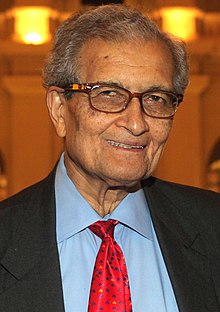Amartya Sen
Indian economist and philosopher
Amartya Kumar Sen (born November 3, 1933) is an Indian economist. Since 1956, he has taught and worked in the United Kingdom and the United States. He worked in welfare economics, social choice theory, economic and social justice, economic theories of famines, and indexes of the measure of well-being of citizens of developing countries.
Amartya Sen | |
|---|---|
অমর্ত্য সেন | |
 Sen in 2012 | |
| Born | November 3, 1933 Shantiniketan, then-British India |
| Nationality | Indian |
| Alma mater | Presidency College of the University of Calcutta (BA), Trinity College, Cambridge (BA, MA, PhD) |
| Spouse(s) | Nabaneeta Dev (1958–1976) Eva Colorni (1978–1985) Emma Rothschild (m. 1991) |
| Children | Nandana Sen |
| Awards | Nobel Memorial Prize in Economic Sciences (1998) Bharat Ratna (1999) National Humanities Medal (2012)[1] |
| Scientific career | |
| Fields | Welfare economics, development economics, ethics |
| Influences | |
| Influenced | |
He was awarded the Nobel Prize in Economics in 1998 and Bharat Ratna in 1999 for his work in welfare economics. He was also awarded the inaugural Charleston-EFG John Maynard Keynes Prize in recognition of his work on welfare economics in February 2015 during a reception at the Royal Academy in the UK.[4]
References
change- ↑ "President Obama Awards 2011 National Humanities Medals". National Endowment for the Humanities. December 13, 2012. Retrieved June 16, 2014.
- ↑ Sen, Amartya (2010). The idea of justice. London: Penguin. ISBN 9780141037851.
- ↑ Deneulin, Séverine (2009). "Book reviews: Intellectual roots of Amartya Sen: Aristotle, Adam Smith and Karl Marx". Journal of Human Development and Capabilities. 10 (2). Taylor and Francis: 305–306. doi:10.1080/19452820902941628. S2CID 216114489.
- ↑ "Amartya Sen announced as the winner of Charleston-EFG John Maynard Keynes Prize 2015". Charleston Trust. February 10, 2015. Archived from the original on August 12, 2020. Retrieved February 15, 2019.
Further reading
change- Forman-Barzilai, Fonna (2012), "Taking a broader view of humanity: an interview with Amartya Sen.", in Browning, Gary; Dimova-Cookson, Maria; Prokhovnik, Raia (eds.), Dialogues with contemporary political theorists, Houndsmill, Basingstoke, Hampshire New York: Palgrave Macmillan, pp. 170–180, ISBN 9780230303058
- Various (2003). "Special issue, on Amartya Sen". Feminist Economics. 9 (2–3). Taylor and Francis.
Other websites
change- Amartya Sen Archived April 15, 2012, at the Wayback Machine at Harvard University
- The Possibility of Social Choice 1998 lecture at NobelPrize.org
- Profile and Papers at Research Papers in Economics/RePEc
- Amartya Sen (1933– ). Library of Economics and Liberty (2nd ed.). Liberty Fund. 2008.
{{cite book}}:|work=ignored (help)
| Media from Commons | |
| News stories from Wikinews | |
| Quotations from Wikiquote | |
| Data from Wikidata | |